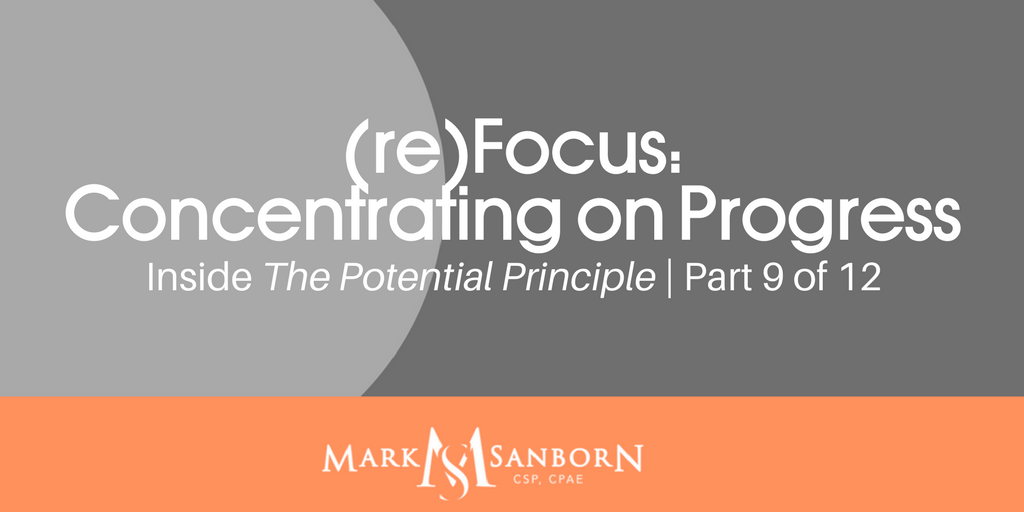Isaac Newton understood the value of focus. He credited his many successes and discoveries as “owing more to patient attention than to any other talent.”
How focused are you? How much time do you waste each day on low-priority or ineffective activities? Imagine what you could accomplish if you stayed consistently focused on other, more important things!
We live in an age of perpetual distraction, with e-mails, text messages, and Facebook posts always vying for our attention. And there are countless little challenges in our personal and professional lives that pull our thoughts away from important goals and impede our progress toward fulfilling our true potential.
The antidote to all this distraction is focus. Or perhaps more accurately, (re)focus. When you disrupt yourself or initiate a change, you must refocus your efforts. Otherwise, your past focus will prevent you from achieving your new goals.
In my new book, The Potential Principle, I offer four powerful tools for creating breakthrough improvement at home and at work. The second tool is this:
(re)Focus your efforts by replacing wrong or low-payoff activities with more productive behaviors.
In the book, I offer many tips on how to do this. One way is to stop multitasking. Research has shown that people who try to accomplish several things at once take longer to do their work and don’t do it as well. That’s because they’re not really multitasking; they’re just rapidly shifting their attention from one task to another.
This constant shifting takes a toll. It depletes the brain’s neurochemical resources, which inhibits concentration, causes mental fatigue, and leads to errors. And because of a phenomenon called attention residue, our minds have a hard time letting go of an unfinished task and giving full attention to a new one.
So instead of “multitasking” all day long, identify the most significant things that you need to accomplish. Schedule specific times to work on them, giving yourself at least thirty to sixty minutes without phone calls, walk-ins, or other distractions. Then focus on one task at a time. Try to complete it before undertaking a new one.
You’ll find this way of operating more productive, more fulfilling, and less time-consuming. (re)Focusing is all about knowing what is important, recognizing the danger of distraction, and committing the time it takes to concentrate on the work.
You become successful by getting focused, but you stay successful
by (re)focusing as necessary when plans and priorities change.
To better your best, (re)focus your time and energy on activities that produce the greatest results and improvement.
Order The Potential Principle at http://bit.ly/potentialprinciple.
 New York Times bestselling author Mark Sanborn’s new book The Potential Principle: A Proven System for Closing the Gap Between How Good You Are and How Good You Could Be is scheduled to release September 5, 2017 and provides a map and method for becoming better than best. By identifying the four key areas in which growth is possible—thinking, performing, learning, and reflecting—and applying the four tools of improvement in those areas—disrupt, refocus, engage, and expand— Sanborn reveals the secret for achieving breakthrough improvement in any area of life. Mark is president of Sanborn and Associates Inc., an idea studio dedicated to developing leaders in business and in life. He is a noted authority and an in-demand speaker on leadership, customer service, and extraordinary performance. To book Mark and share the message of The Potential Principle with your team, please contact Michelle Joyce at michelle@michellejoyce.com or (704) 965-2339.
New York Times bestselling author Mark Sanborn’s new book The Potential Principle: A Proven System for Closing the Gap Between How Good You Are and How Good You Could Be is scheduled to release September 5, 2017 and provides a map and method for becoming better than best. By identifying the four key areas in which growth is possible—thinking, performing, learning, and reflecting—and applying the four tools of improvement in those areas—disrupt, refocus, engage, and expand— Sanborn reveals the secret for achieving breakthrough improvement in any area of life. Mark is president of Sanborn and Associates Inc., an idea studio dedicated to developing leaders in business and in life. He is a noted authority and an in-demand speaker on leadership, customer service, and extraordinary performance. To book Mark and share the message of The Potential Principle with your team, please contact Michelle Joyce at michelle@michellejoyce.com or (704) 965-2339.









Glad to know that you have a book about (re)focusing. This is just what I need. I easily get distracted or lose my focus in just a snap and I struggling getting it back again. As a result, I end up wasting so much of my precious time that could have been spent doing more valuable things.